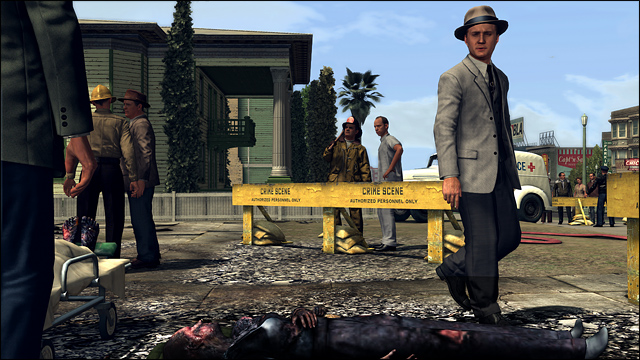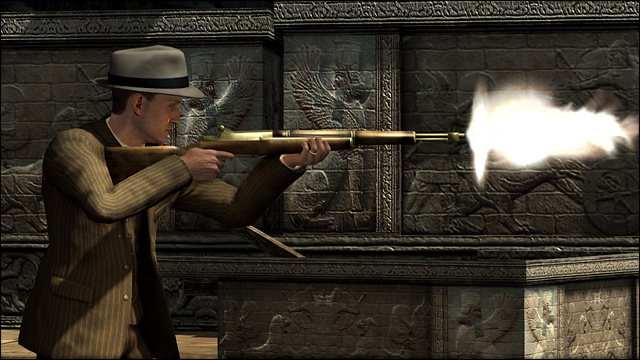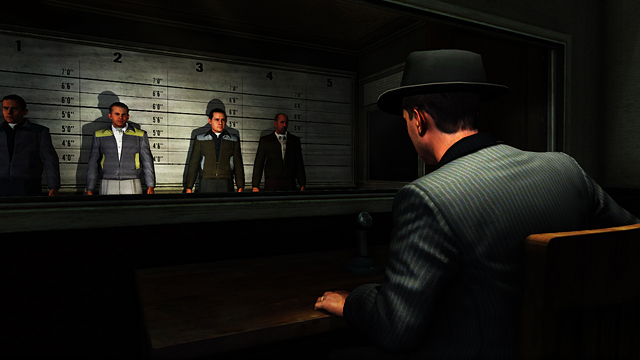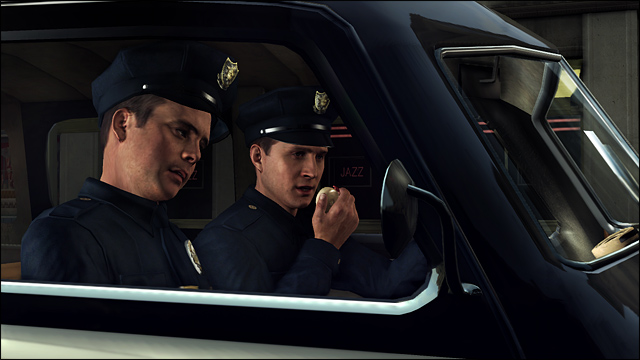L.A. Noire: A different kind of war
Spoiler warning: Everything about L.A. Noire. EVERYTHING. Also a significant spoiler for Heavy Rain, though ultimately incidental to the main story.
The most common L.A. Noire comparison I’ve seen is to Phoenix Wright, which I’ve never played. So for me, the closest cousin I can think of is Heavy Rain, Quantic Dream’s experiment in melding choose-your-own-adventure murder-mystery storylines with quick-time-event gameplay. The similarities seem obvious: they’re third-person games requiring you to solve various mysteries, and both have a very heavy emphasis on story and characterization with little in the way of traditional action gameplay (shooting, fighting, etc.).
I think that when we look back in a few years, we’ll think of Heavy Rain and L.A. Noire in the same way: ambitious but highly flawed projects trying to redefine the kinds of narratives and sensibilities we can expect out of video games. Whether you’ll like either one or not seems to depend largely on how many problems you’re willing to forgive to experience something truly original. That said, I’ve found it harder to love L.A. Noire than I did Heavy Rain, which is bizarre because I usually value the quality of the story in a game, and Heavy Rain’s plot has holes the size of Mack trucks. For me, Heavy Rain was a thrill ride that kept me guessing and on edge until the final showdown; it was only after I’d finished the game that I began to realize all the problems with the narrative house of cards David Cage and Quantic Dream had constructed. L.A. Noire’s faults show up much, much earlier and linger like a bad aftertaste throughout the game.
I’ve been thinking about one of the few moments in Heavy Rain that really made me feel like I was playing an entirely new experience, and not just a more elaborate (though still enjoyable) version of a God of War boss battle. It’s the moment when, as Norman Jayden, you have to face a religious nut who’s pulled a gun on your partner. You have two options at that point: either talk him down and get him to give you the gun, or shoot the guy in the face. Most people, if I’m gauging the gamer population correctly, probably picked the first option. During the entire sequence, even if you try to calm Nathaniel down instead of shoot him, you always have the option to pull the trigger. So I’m also guessing that when Nathaniel suddenly reached into his pocket after you’d calmed him down, about as many gamers puller the trigger and shot him—only to discover Nathaniel was actually pulling out a crucifix.
It’s a shocking moment, not the least of which is because of the build-up. You don’t know anything about Nathaniel except that he’s a certifiable nut. Your partner doesn’t like the look of him, and does everything in his power to goad Nathaniel into doing something violent. The entire time, you’re always aware of how little it would take for the situation to slip into violence, even against your will. The game itself is basically begging you to shoot him; when Nathaniel reaches into his jacket, the only prompt on the screen is the R1 button above his head, which means “shoot the bastard in the head.” Conditioned at this point to follow pretty much any lone prompt on the screen, you follow the directions—and snuff out a man’s life after you’ve painstakingly worked to save it. It’s your first, or at least most obvious, lesson in Heavy Rain that your intent and your ability to execute on that intent can be separated by a huge gulf of instinct; what you think is the right thing to do can end up being the wrong thing. Heavy Rain tricks you into doing something awful, but it never feels like a cheat. If you were in Norman Jayden’s shoes in real life, you might’ve pulled that trigger anyways.
Heavy Rain has a few moments like this, but nothing that quite approaches the level of Norman Jayden’s encounter with Nathaniel. But L.A. Noire feels like it’s full of such moments, when what you want to do is disconnected from what you can do, or what you know enough to do. And unlike Heavy Rain, the feeling you get is not one of revelation, or of a game subverting your expectations about how a game should work. In L.A. Noire, the result is frustration: frustration that you can’t ask your subjects the questions you want, frustration that you only get three options for each question and one shot to get the answer you need or not, and frustration that you will rarely, if ever, be able to say all the right things to get your subject to talk—not because you genuinely misread them, but because you literally didn’t know what you were going to say before you said it.
L.A. Noire’s interrogations often require you to follow a specific, prescribed set of responses, which is the first problem. Interviewing another person is often more nuanced then just picking the right response every so often; the whole conversation is full of subtle back-and-forth interactions that could reveal new avenues of attack or point to contradictions in testimony. L.A. Noire does a poor job of capturing this sometimes. But this problem is forgivable; the programming complexity involved in letting the player asking any question they liked, or conducting an interrogation any way they liked, is astronomical. Unfortunately, these limitations lead to another problem: often, it feels like L.A. Noire punishes the player for making what appear to be logical connections.
The most obvious example comes when you start doing Vice cases. Eventually you run into some of Cole Phelps’ buddies from the war, who have gotten themselves entangled in a morphine-smuggling operation that’s killing junkies left and right. At the end of one case, you interrogate Courtney Sheldon, the leader of your wayward Marines. Armed with a mountain of evidence against him, you only have the option to ask two questions of very similar natures. Sheldon lies in response to both of them, and lies badly. But picking a piece of evidence to contradict Sheldon is not so clear-cut. This happens a lot in L.A. Noire—you’ll know a person is lying to you because you know what really happened, but then you’ll have a hard time trying to figure out what piece of evidence contradicts their answer. In Sheldon’s case, I picked the wrong piece of evidence both times, even though they were both clearly contradictory to his general statements.
I finally consulted a walkthrough, thoroughly frustrated with the game’s continued insistence that I didn’t know what I was talking about. In the end, it turned out I’d picked the right pieces of evidence—but for the wrong questions. When you ask Sheldon about the S.S. Coolridge robbery, the correct piece of evidence isn’t the note you pick up about Sheldon’s meeting with a mafia gangster; it’s the last words of one of Sheldon’s Marines. And when you ask Sheldon about the Marines being targeted, you’re supposed to pick the note instead of the confession. In both cases, Sheldon’s lie basically amounts to “how do you even know we’re involved?” Both pieces of evidence work. But if you pick them in the wrong order, you’ve failed the interrogation and you should feel bad about yourself.
That’s not the only reason you should feel bad, either. L.A. Noire’s withering disapproval of your actions is built into the narrative itself. Cole Phelps is a man of supposed moral fiber; he does everything by the book and strictly adheres to regulations. It’s his faith in law and order that leads him to become a police officer in the first place. But Phelps is not infallible; he’s seen and done some horrific things during the war that he tries to atone for in his postwar life. But as soon as Phelps becomes a detective, he starts spending time at The Blue Room, a local jazz club with a German singer as its star attraction. Eventually, during a vice case, L.A. Noire makes it clear: Phelps is sleeping with the German. And it eventually becomes his downfall; your partner in vice sells you out to protect his own interests, and the police force tells you in no uncertain terms that your name is now dogshit, and you can look forward to spending the rest of your pitiful career in drab, uneventful assignments that will get you precisely nowhere in life.
Set aside for the moment that L.A. Noire does a really horrible job of preparing the player for the consequences of adultery, which turn out to be a lot more severe than they would be today. A pivotal moment in your character’s history, a moment that destroys his reputation and makes him persona non grata to the entire force? You get absolutely no say in it. Which makes L.A. Noire exactly as interactive as, say, a decent film noir. But the difference is that in the film, you’d actually get a sense of what the protagonist is giving up to be with the forbidden fruit, and why. You’d see the relationship between the detective and the German singer form, see how self-destructive it is, understand why the detective would want to pursue it anyways. In L.A. Noire, you get exactly none of that exposition. As a result, it just feels like the game is punishing you again, and this time for something that took place entirely in cutscenes, completely out of your control. And the game definitely punishes you; your first case in Arson is basically an opportunity for everyone in the LAPD to tell you what a fucking asshole you are for sleeping with a Nazi sympathizing slut. Great. Fantastic. Can’t wait to keep playing.
But it turns out that Cole Phelps’s fall from grace has implications for the plot. Without his relationship to Elsa, Phelps would have no way to bring Jack Kelso in to continue the investigation into Elysian Fields, and without Jack Kelso, there’s no ending to the story. Furthermore, Phelps himself changes; as Elsa remarks near the end of the game, Phelps no longer lives in his ivory tower; he’s come back to earth, no longer so invested in being the crusading hero he once saw himself as. So his idiotic blunder adds crucial depth to his character. It also has the effect of making him a far less likeable protagonist.
This is where L.A. Noire feels most revolutionary: if you play a character who must do something irredeemable to serve the needs of the story, and that makes you not want to continue playing as that character, is that a triumph or a failure? When Phelps—and by association, you—faces an endless stream of accusations and insults, Phelps has no choice but to continue working. But you can put down the controller at any time and decide you never want to come back. There are lots of people who would simply decide they were done with the game, much as there are people who will be frustrated by the heavy-handed ways L.A. Noire restricts your freedom in a theoretically open world—a world where you can’t run people over or shoot anyone unless the game says you can. These people will find L.A. Noire disappointing.
Even if you make it past all that, L.A. Noire has enough flaws that it’ll be hard to hail it as an unqualified success. But there’s so much that L.A. Noire does right, and so much ambition on display, that you can’t help but respect Team Bondi and Rockstar for what they’ve tried to do here. A few years ago, it would’ve been very hard to imagine a Grand Theft Auto-style game done from the perspective of a police officer, and without the trademark satirical tone. What’s the worth of an open-world game if you can’t blow everything up and gun down random pedestrians in the street? But here we are: a 1940s detective story done with a completely straight face. It’s not only an interesting game to play, it’s also a highly convincing world to live in. For that alone, Team Bondi and Rockstar deserve respect.
[This article, sans images, originally appeared on Wesley’s Dear Game Diary tumblr]
















387944 792294When I initially commented I clicked the -Notify me when new comments are added- checkbox and now each time a remark is added I get four emails with exactly the same comment. Is there any manner you possibly can take away me from that service? Thanks! 350422
808098 525917hey there i stumbled upon your website searching around the internet. I wanted to tell you I enjoy the look of issues about here. Maintain it up will bookmark for positive. 130847
453626 825751Extremely good design and style and great subject matter, really little else we want : D. 760017
655217 415305I genuinely like forgathering utile info, this post has got me even far more information! . 212440
143613 299564Its a shame you dont have a donate button! Id without a doubt donate to this brilliant blog! I suppose for now ill settle for book-marking and adding your RSS feed to my Google account. I appear forward to fresh updates and will share this blog with my Facebook group. Chat soon! 368632
100792 288857I see something genuinely unique in this web site . 66317
512075 379582Specific paid google internet pages offer complete databases relating whilst private essentials of persons while range beginning telephone number, civil drive public records, as effectively as criminal arrest back-ground documents. 520324